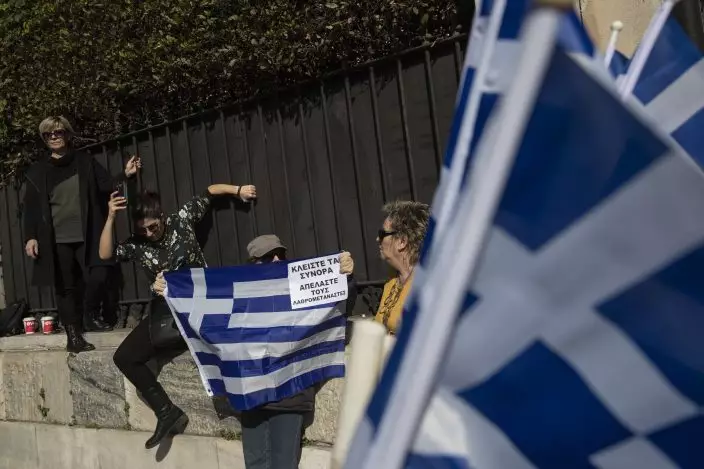Mayors and residents of Greek islands hardest hit by the country's refugee crisis have protested in central Athens against government plans to build a network of detention camps.
The officials called off a meeting that had been planned Thursday with the government and staged the demonstration outside parliament, joined by several hundred island residents.
Lesbos, Samos, and three other islands in the eastern Aegean Sea are struggling to cope with severe overcrowding at camps for refugees and migrants following a surge in arrivals from nearby Turkey.

Protesters hold placards as they demonstrate outside the Interior Ministry in central Athens, on Thursday, Feb. 13, 2020. Regional government officials and residents from Lesbos and four other Aegean Sea islands oppose government plans to build new sites for migrants and refugees, and are demanding that thousands of asylum seekers at overcrowded camps on the islands be moved to the Greek mainland. The Moria refugee camp on the island of Lesbos currently has more than 20,000 people at a facility built for just 3,000 people. (AP PhotoPetros Giannakouris)
The government earlier this week announced an initative to build detention facilities on the five islands, arguing that the move is vital to properly organize the registration of asylum seekers and deport migrants denied international protection.
But island authorities are planning legal challenges and blockades at the sites where the new camps are planned to try to block construction.
Stratis Kytelis, mayor of Lesbos capital Mytilene, said the protests had started after the government failed to fulfill a pledge to drastically reduce the number of migrants on the island over the winter months.

A protester holds a Greek flag and a paper that reads in Greek. "Close the Borders, Deport illegal migrants" as they demonstrate outside the Interior Ministry in central Athens, on Thursday, Feb. 13, 2020. Regional government officials and residents from Lesbos and four other Aegean Sea islands oppose government plans to build new sites for migrants and refugees, and are demanding that thousands of asylum seekers at overcrowded camps on the islands be moved to the Greek mainland. The Moria refugee camp on the island of Lesbos currently has more than 20,000 people at a facility built for just 3,000 people. (AP PhotoPetros Giannakouris)
"We don't believe their assurances that all existing structures will be shut down," Kytelis told the Associated Press.
"People on the islands ... opened their homes and gave what little they had to help (refugees) but unfortunately, because of bad policies the situation is now out of control," he said. "Europe has put up walls against us, and trapped immigrants and refugees on our island."
A surge in migrant arrivals last year has caused serious overcrowing at existing refugee camps on the islands, with some 20,000 at a facility on Lesbos built to house 3,000.
Migrants on the islands are forbidden to travel to the Greek mainland without special permission under a 2016 agreement between the European Union and Turkey, aimed at limiting the number of illegal crossings to Europe.


